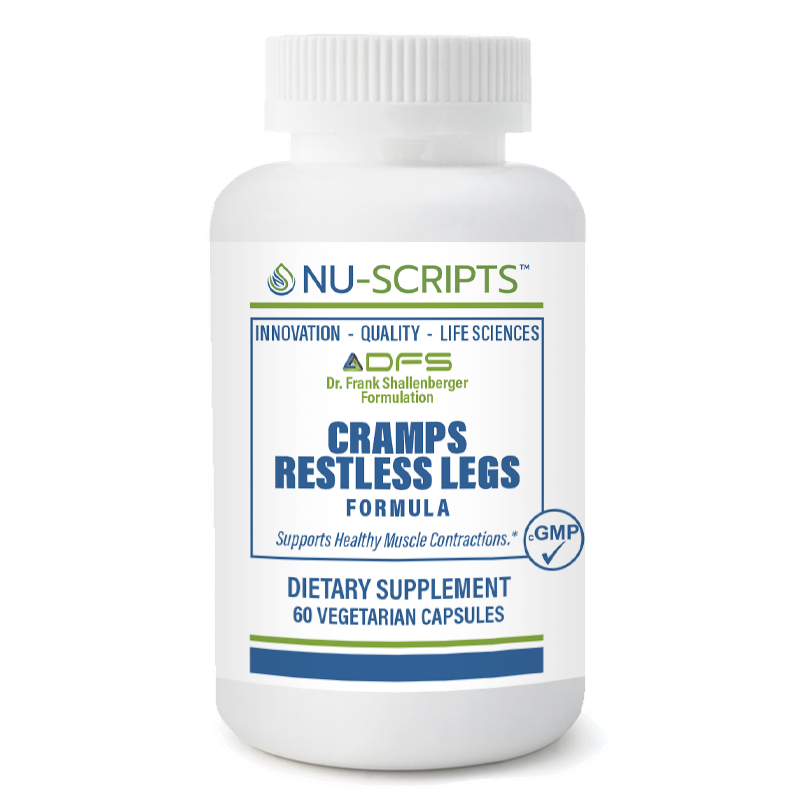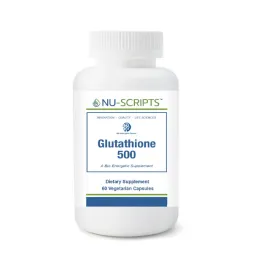Cramps/Restless Leg (DFS)
- $34.99
- Quantity Tier Pricing
- 2 or more $26.49
- 12 or more $20.99
Health Benefits of Key Ingredients for Cramps and Restless Legs Syndrome
1. Magnesium
Overview:
Magnesium is an essential mineral involved in over 300 enzymatic reactions in the body, including those that regulate muscle and nerve function.
Health Benefits:
Muscle Relaxation: Magnesium helps control the movement of calcium and potassium across muscle cell membranes, preventing excessive contraction that can cause cramps.
Neuromuscular Support: Adequate magnesium levels reduce nerve hyperexcitability, which may decrease the involuntary movements and tingling sensations associated with restless legs syndrome.
Improved Sleep Quality: Magnesium supports the production of melatonin and GABA, which promote deeper, more restful sleep—often disrupted in individuals with RLS.
Clinical Insight:
Magnesium supplementation has shown benefits for individuals with nocturnal leg cramps or muscle tightness, particularly when deficiency or increased loss (e.g., through sweat or stress) is present.
2. Sodium
Overview:
Sodium is a vital electrolyte that maintains fluid balance, nerve conduction, and muscle contraction.
Health Benefits:
Electrolyte Balance: Adequate sodium prevents dehydration-related muscle cramps by maintaining fluid and mineral equilibrium within muscle tissues.
Nerve Function: It supports the generation of electrical impulses required for coordinated muscle movement, potentially reducing spasms.
Clinical Insight:
Cramps triggered by electrolyte depletion (such as from sweating or fluid loss) often respond to sodium replacement. However, excess intake should be avoided, especially in individuals with hypertension or kidney disease.
3. Ginger Root (Zingiber officinale)
Overview:
Ginger contains active compounds such as gingerol and shogaol, which exhibit anti-inflammatory and antioxidant properties.
Health Benefits:
Anti-inflammatory Action: Helps reduce inflammation in muscles and nerves that may contribute to cramping and discomfort.
Improved Circulation: Ginger supports peripheral blood flow, enhancing oxygen and nutrient delivery to muscle tissue.
Pain Relief: Its mild analgesic effect may lessen muscle soreness and the discomfort associated with RLS.
Clinical Insight:
While clinical data specific to RLS are limited, ginger is commonly used as an adjunct to relieve muscular tension and support circulation, particularly in individuals with inflammatory or vascular causes of cramps.
4. Turmeric (Curcuma longa)
Overview:
Turmeric’s primary active compound, curcumin, has potent anti-inflammatory, antioxidant, and neuroprotective effects.
Health Benefits:
Reduced Inflammation: Curcumin can modulate inflammatory pathways that may aggravate neuromuscular irritability and cramping.
Neurotransmitter Support: Curcumin supports healthy dopamine function, which is relevant to the underlying mechanisms of RLS.
Circulatory and Muscle Recovery Benefits: Promotes better blood flow and helps reduce oxidative stress in muscles.
Clinical Insight:
For optimal absorption, turmeric should be consumed with black pepper (piperine) or a lipid base. Curcumin may complement other therapies for RLS through its anti-inflammatory and neuroprotective actions.
5. Cassia Seed (Semen Cassiae)
Overview:
Cassia seed, used in traditional Chinese medicine, is valued for its cooling, anti-inflammatory, and muscle-relaxant properties.
Health Benefits:
Muscle Relaxation: Traditionally used to relieve tightness and muscle tension that can contribute to cramping.
Improved Circulation: May promote smooth blood flow to the lower limbs, supporting muscle nourishment.
Sedative and Calming Effects: Cassia seed may promote relaxation and support better sleep quality, which can help alleviate nighttime RLS symptoms.
Clinical Insight:
While modern research is limited, traditional and preliminary evidence suggests Cassia seed may serve as a gentle, natural muscle relaxant and circulatory aid.
6. L-Dopa (Levodopa)
Overview:
L-Dopa is a naturally occurring amino acid precursor to dopamine, a neurotransmitter essential for motor control.
Health Benefits:
Restores Dopamine Balance: Dopamine deficiency or dysfunction in the brain is a key factor in restless legs syndrome. L-Dopa supplementation can help restore dopamine activity, reducing leg restlessness and urge to move.
Reduces Nocturnal Discomfort: By improving dopamine levels, L-Dopa can lessen night-time leg movements and improve sleep quality.
Improves Motor Function: Enhances coordination and reduces muscular discomfort related to dopaminergic imbalance.
Clinical Insight:
L-Dopa (often prescribed as levodopa/carbidopa) is an evidence-based treatment for RLS, particularly for intermittent or mild cases. Long-term use requires medical supervision due to the risk of augmentation (worsening or earlier onset of symptoms over time).
* Please be aware that packaging displayed on our website may vary from your order based on factors such as availability and supplier changes, or to improve the readability of product details.
* These statements have not been evaluated by the Food and Drug Administration. This product is not intended to diagnose, treat, cure, or prevent any disease.
Related Products
Tags: cramps , restless leg syndrome , rls relief ,







